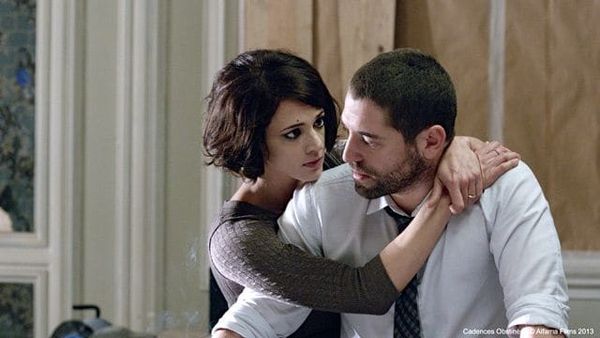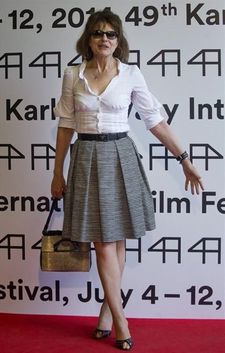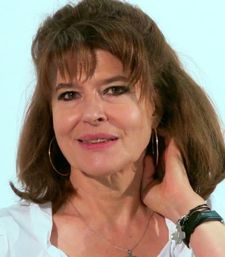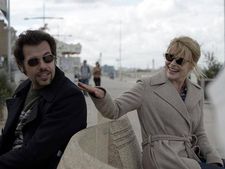 |
| Asia Argento and Nuno Lopes in Obsessive Rhythms |
She continues to reinvent herself – not least behind the camera as a director. That’s the reason she’s at the Karlovy Vary International Film Festival for presentations of Obsessive Rhythms (Cadences Obstinées) a drama about a former cellist stuck in a dead-end relationship with an obsessive architect and featuring an impressive cast of Asia Argento, Nuno Lopes, Ricardo Pereira, Gerard Depardieu, and Franco Nero.
 |
| "The point of view of someone else has always interested me" Photo: Richard Mowe |
Ardant was discovered by international audiences in 1981, when she starred opposite Gérard Depardieu in The Woman Next Door (La Femme d'à Côté), directed by François Truffaut (with whom Ardant had the first of her three daughters), and she received much attention for her portrayal of opera diva Maria Callas in Franco Zeffirelli's, Callas Forever.
At 65, she shows no sign of easing up on her myriad activities. Shortly she rejoins Depardieu to take up the challenge of the devastating text by Marguerite Duras, La Musica deuxième, in which they portay a couple who fall in love and come together, and marry in order to “be like everyone else”… before they fall apart. She has a role in a new film to shoot in October and is just finishing writing her third film as a director. “And then I’ll begin the hunt for money, money, money …” she says.
She is too much the classical femme fatale of dramatic looks, smouldering personality, and a propensity to being a loner to fit comfortably into any preordained mould. Truffaut in his memoirs described the enduring attraction: "I was seduced by her big month, and her great dark eyes". Without seeming paranoid, she guards zealously her mystique by declining to talk about her daughters' three fathers, her apparently chequered private life or her current status. On all other subjects she expounds with infectious gusto.
As far as her acting roots go she says: “Everything nourishes what I do. When I studied science and politics as a student I did not learn that much but what was exciting were the conversations and discussions, which could go on all night. We reinvented the world and imagined things to be completely different. The point of view of someone else has always interested me. I never read the reviews written by the critics but if I meet a journalist who wants to discuss things with me then I am more than happy to do so. I always listen to what they have to say even if I do not agree with it. It is important to keep an open mind to lots of different things.
“The first great director who had confidence in me and gave me my first main role was François Truffaut. I believe that he stays in me, and besides that I’ll never forget the way he behaved on a shoot. His enthusiasm and passion and the way he dealt with actors. He believed that even an actor in a small role should be given the red carpet treatment and he had to be feel both welcome and protected because an actor always will be vulnerable. I appreciated this approach because on other films that I was asked to appear in I always tried to ascertain whether the director was passionate, enthusiastic and generous before I would commit."
 |
| Fanny Ardant: “Everything nourishes what I do" Photo: Richard Mowe |
Ardant gives her summation of the character a nod of approval. She argues she is not a feminist but a free woman who will fight for herself. "So in that way, I am selfish. The countess is the same she struggles for her own power."
She also felt a powerful affinity for opera diva Maria Callas whom she played on screen and also on stage in Paris under Roman Polanski's direction in Terence McNally's play Master Class. One of her hugely popular turns was as Eva, the lovelorn owner of a gay night club in the hit comedy, Pedale Douce. "People thought I was Eva, and shouted her name in the street in a friendly way. I liked the character because she was strong, anarchic. She was prepared to go to the end for her beliefs, and she was a bit of a loner. If there is one thing in common with all my characters it is their need for, and appreciation of, solitude."
She demands the same qualities in her directors as she seeks in her friends. They can be clumsy and make mistakes, but they must never exhibit feelings of boredom or disinterest. They must have huge reserves of energy and an obligatory sense of humour. "When a man makes you laugh, then he brings light into your life - and you're won over," she says.
Ardant was won over to the idea of acting by moving in Royal circles in Monaco where her father was Prince Rainier's military governor. His partner Grace Kelly encouraged her aspirations. To this day she recalls her words of advice about maintaining a youthful outlook and appearance: "Live each period of your life to the fullest. Then you’ll never regret anything." Her family were less enthusiastic about her ambitions. They encouraged her to study political science at university in Aix en Provence. She completed the degree with flying colours by submitting a thesis on anarchy ... just to prove her rebellious spirit was still intact.
 |
| Laurent Lafitte and Fanny Ardant in Bright Days Ahead by Marion Vernoux. Ardant: "Live each period of your life to the fullest. Then you’ll never regret anything." |
As a teenager she was a voracious reader, consuming such classics as Flaubert's Madame Bovary and Balzac’s Colonel Chabert, which she filmed with Gerard Depardieu, their first movie together since Truffaut had co-starred them in The Woman Next Door as old flames, more than 13 years previously.
It was through her reading of Bovary, in particular, that she recognised something that struck chords. "Some people say that in today's world you can no longer live a passionate, romantic love affair. In The Woman Next Door François wanted to show that even in the framework of modern everyday life - at the supermarket or in the parking lot - you can know the same passion as Madame Bovary. It's my way of life to be always dissatisfied, and the fact that the grass is always greener somewhere else."
In her sixth decade Ardant is coming to terms with the pressing realisation that life is becoming shorter. Her answer? "Never regret the past ... never say it was better. You have to intensify the action just like we do in the movies."
Bright Days Ahead currently on release in the UK.





















